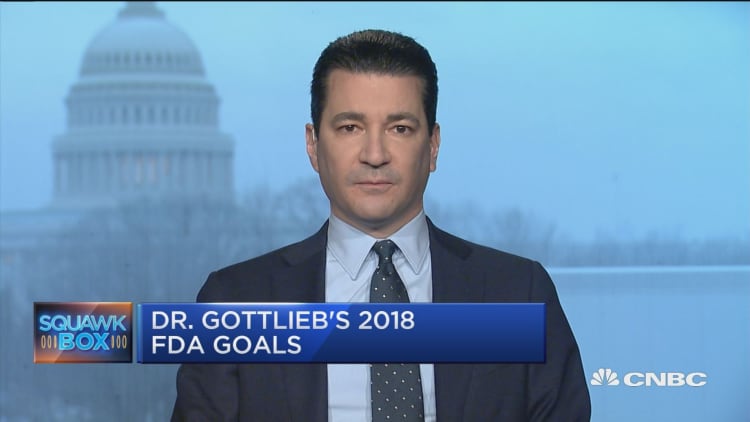Terminally ill patients can be desperate for any treatment that might save their lives. Even if the chances are bleak, it seems worth a shot. That dire need has led Congress to pursue a bill that would allow patients to access experimental drug treatments that bypass the Food and Drug Administration's clinical trial process. But the legislative fight pits President Donald Trump and other powerful conservatives, including the Koch brothers, against many voices from the medical community and patient advocacy organizations.
Trump prodded lawmakers last week to turn the bill, known as "Right to Try," into law. A lawmaker working closely on the issue said the president asked him point blank, "How close are you to getting this done?" Trump previously stressed the importance of the bill in his State of the Union Address.
The Goldwater Institute, a libertarian think tank backed by the Koch brothers, is the main political think tank pushing Right to Try. It already has helped the legislation pass in 38 states.
But resistance among patient advocate groups is strong. Thirty-eight groups wrote a letter to Congress on Feb. 6 arguing that the bill would actually hurt terminally ill patients. The coalition, which includes the American Lung Association and the American Cancer Society Cancer Action Network, said in the letter to Congress that Right to Try would exploit vulnerable patients and allow unethical companies and providers to circumvent the FDA and sell dangerous medicine to desperate people.
"It is important to remember that the current regulatory system for medical products and research in the United States was created as a result of serious patient harm and exploitation that occurred early in the 20th century," the letter states. "Clinical research subject protections are in place when experimental products are being tested to ensure the safe and ethical treatment of research participants."
The FDA already has a system in place to give terminally ill patients access to experimental treatments not approved by the FDA. The system, called compassionate use or expanded access, requires the consent of a doctor and drug company. If the FDA doesn't object to a patient taking the unapproved drug, the patient can do so. The letter points out that the FDA approved 99.7 percent of compassionate-use requests, but supporters of Right to Try believe the approval process takes too long. The FDA states on its website that treatment may begin 30 days after FDA receives an investigational new drug application (IND), or earlier if FDA notifies the treating physician that the expanded access use may begin.
As the Right to Try campaign increased its efforts in recent years, the FDA made moves to streamline the application process for patients and doctors seeking experimental drugs that are outside clinical trials.
"Currently, when unapproved drugs are administered to patients for research purposes, important ethical and safety mechanisms are in place," Alissa Crispino, a spokesperson for the American Cancer Society Cancer Action Network said in an email to CNBC.
This wouldn't be the case if Right to Try became law.
"It removes important safety protections and creates openings for potential bad actors to take advantage of patients," Crispino said.
Trump's FDA chief has concerns about the bill
The bill passed in the Senate by a unanimous vote in August. Wisconsin Republican Sen. Ron Johnson sponsored the bill. He threatened to hold up an FDA funding bill unless the Senate voted on Right to Try. The Senate's bill would allow anyone who faces a "life-threatening disease or condition" to access experimental treatments.
The bill now faces some rewording in the House. "We're working to make sure that the program will work for the patients who need access to these medicines," said Rep. Greg Walden, a Republican from Oregon and the chairman of the House Energy and Commerce Committee, who was quoted on Trump's question about Right to Try last week. "We want to make sure it's safe. We want to make sure it works and they can take advantage of it."
Despite the bill's powerful backing, the safety and ethical concerns voiced in the coalition's letter, and comments from FDA Commissioner Scott Gottlieb — one of the few Trump major appointments to not face a major backlash from the left — have grabbed the House's attention. Gottlieb wants the Senate wording narrowed to people facing "terminal illness."

A spokesperson for Congressman Walden said he is working with the bipartisan committee to balance individual rights and patient safety. Walden's recent comments indicate that a change to the wording (or a new bill altogether) is inevitable. Either outcome means the bill will return to the Senate.
"We'll be working with [the groups that wrote the letter] once we get language — and we've been in communication with them on language," Walden said to reporters on Capitol Hill on Feb. 14. "We've been working with Scott Gottlieb. I've met directly with the vice president, so there's a lot of discussion going on."
Cutting out the FDA as a gatekeeper increases the risk of patients being harmed through the peddling of false hope and snake oil.Michael Beckera terminally ill cancer patient and the former president of pharmaceutical company Cytogen
Opponents of the legislation say it is nothing more than an attempt to undermine the FDA. They worry that without the FDA involved, drug companies will be allowed to harm patients without any legal recourse. And there's the fear that complications caused by these experimental treatments won't be covered by insurance.
Michael Becker, a terminally ill cancer patient and the former president of pharmaceutical company Cytogen, described his opposition in a first-person piece.
"People like me already have access to experimental therapies," Becker wrote. "Cutting out the FDA as a gatekeeper increases the risk of patients being harmed through the peddling of false hope and snake oil."
More from Modern Medicine:
A recent breakthrough could result in blockbuster obesity drug
A new way to prevent hair loss in cancer patients
The booming business in radiation pills in Trump vs. N. Korea era





